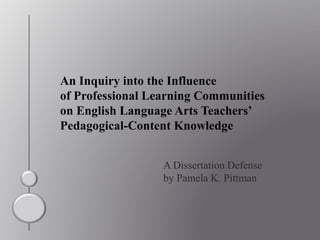
Dissertation Defense
- 1. An Inquiry into the Influence of Professional Learning Communities on English Language Arts Teachers’ Pedagogical-Content Knowledge A Dissertation Defense by Pamela K. Pittman
- 2. Introduction Teaching is an ever-evolving profession. Teachers must stay abreast of recent research and trends continually deepen their knowledge and refine their skills Teachers need high quality professional development to help them master content and strengthen their teaching skills (Darling-Hammond et al., 2009) Professional learning communities offer teachers one way to collaborate and engage in professional learning.
- 3. Background This case study focused on the experiences of three middle grades English Language Arts (ELA) teachers mandated by their school district to participate in professional learning communities (PLCs) as a form of professional development. The teachers who participated in this study worked in a rural, Title I school in a low-income community with a student population of 235 students, including: 80% minority 95% free and reduced lunch 48% reading proficiency (NCDPI, 2012)
- 4. Research Questions How do ELA teachers’ experience professional learning communities as a form of professional development? What were the affordances and limitations of participation in the PLC for these teachers to further develop their pedagogical-content knowledge (PCK)?
- 5. Study Participants: ELA Teachers Name* Race Gender Years of exp. and educational settings Grade Taught Tia Hispanic Female 7 total (4 high school, 3 middle) 6 Maribel African American Female 13 total (5 yrs certified) 7 Batrice African American Female 1 (in China) 8 *pseudonyms replace teacher names Participants
- 6. Theoretical Framework Content Knowledge Pedagogical Knowledge Pedagogical ContentKnowledge Shulman's pedagogical content knowledge framework. Adapted from “Those who understand: Knowledge growth in teaching,” by L. Shulman,1986, Educational Researcher, 15(2), 4-14. Copyright by the 1986 American Educational Research Association.
- 7. (DuFour & Eaker, 1998) Professional Learning Communities at WorkTM model PLCs Three crucial questions every PLC must answer: 1) What do we want students to learn? 2) How will we know when they have learned it? 3) What will we do when they did not learn it?
- 8. Teachers reflect on current beliefs, assumptions, & practices Teachers share their reflections in their PLC Teachers create an action plan for improvement Teachers implement the plan of action Teachers evaluate the results of the plan and begin again PLCs at WorkTM Team Learning Component Cycle of Collaborative Inquiry (DuFour & Eaker, 1998)
- 9. Findings RQ1: How do ELA teachers experience professional learning communities as a form of professional development? Theme 1 Under-developed, under-utilized ELA PLC different training meeting issues team building, not team learning Theme 2 Inconsistent teacher perceptions about PLC’s purpose impact on knowledge & skills – a disconnect ELA PLC purpose & goals grade level PLC purpose & goals Theme 3 Overemphasis on the collection of student assessment data classroom activities (annotation, AR, academic checks) use and influence of student assessment data (STEP, leveled groups)
- 10. Findings RQ2: What were the affordances and limitations of participation in the PLC for these teachers to further develop their PCK? Potential affordances: Space for content collaboration and the sharing of teacher knowledge, instructional strategies, and resources A supportive environment Data-driven instruction Limitations: Inadequate time for meeting Teachers’ limited experience working in PLCs Missed opportunities for collaborative inquiry Incomplete follow-through on tangible PLC products (e.g. district –required presentations and reports) Ineffective data analysis
- 11. Conclusions The ELA teachers in this study need: training in collaborative inquiry time and opportunities to engage in systematic, intentional collaborative inquiry (action research) subject area PLCs integrated into the school day book study and opportunities to attend professional conferences focus on student learning
- 12. Future Research Directions The findings of this study prompted questions for further study including: How do veteran teachers experience PLCs? How do other subject area teachers experience PLCs at this school? What happens when teachers learn to conduct action research in their classrooms? How does consistent, effective leadership impact teacher learning in PLCs? How do the Common Core State Standards (NGA, 2010) influence teacher learning in PLCs? What are students’ experiences in data-driven schools? How do teachers in higher income communities with other demographics experience PLCs?